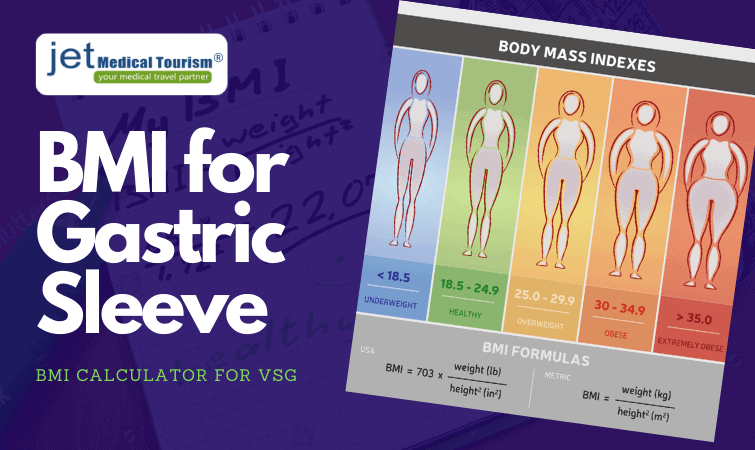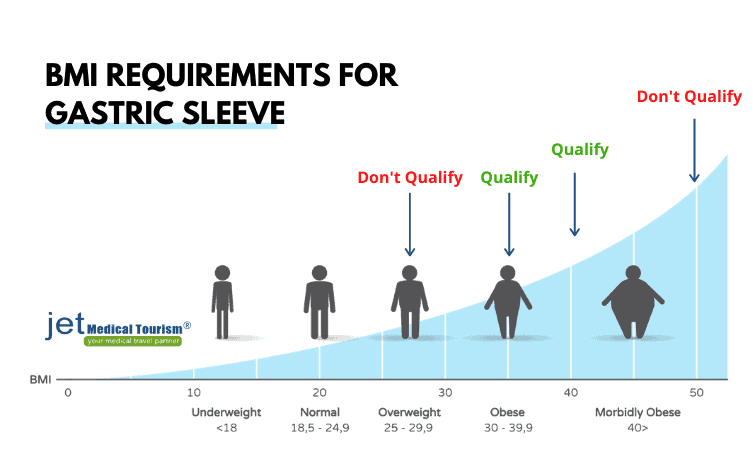BMI For Gastric Sleeve Surgery

BMI for gastric sleeve is the foremost parameter to determine an individual’s eligibility for bariatric surgery. It is the most reliable metric to identify obesity and segregate it into different categories based on its severity. At the time of your pre-operative consultation, your bariatric surgeon will explain to you the BMI requirements for gastric sleeve. They will measure your BMI and evaluate other factors to decide whether you are a good candidate for gastric sleeve surgery.
Age is also a factor in determining candidacy because BMI for VSG will vary for adults and teens. VSG is a relatively less invasive procedure than other forms of bariatric surgery. Therefore, in a few cases, low BMI gastric sleeve may also be performed, depending on the patient’s overweight status and underlying medical condition. You can use an online BMI calculator for gastric sleeve to know your current body mass index.
Does your BMI for gastric sleeve qualify you for weight loss surgery? Our experienced bariatric surgeons at Jet Medical Tourism® will answer this question for you. Contact us now!
What is BMI (Body mass index)?
Body Mass Index or BMI for gastric sleeve is your body weight (measured in kilograms) divided by the square of your full height (measured in meters). The unit of BMI is symbolically expressed as kg/m2. The higher is your body weight in related to your height, the higher will be your BMI. The implication is that to determine whether you are overweight or you suffer from obesity, your absolute weight in kilograms or pounds is not relevant.
What is relevant is your body weight in relation to your body height. BMI for vertical sleeve is the unit to quantify this relationship. Gastric sleeve BMI 30 is the standard bottom line of obesity. However, your bariatric surgeon may clear you as a candidate only at gastric sleeve BMI 35 or higher. Low BMI VSG may be accepted only in exceptional cases. Discuss your BMI for gastric sleeve requirements during your consultation to make an informed decision.
BMI requirements for gastric sleeve

BMI for gastric sleeve is a simple and inexpensive tool to decide if you are a candidate for VSG. Leading global organizations for metabolic and obesity surgery have outlined the standard BMI requirements for gastric sleeve. Your weight loss surgeon will follow these international guidelines while making their professional recommendation to you. You will usually be eligible for gastric sleeve surgery if you fulfill at least one of the following conditions.
- Gastric Sleeve BMI 40: If your BMI is 40 or higher, you will usually qualify for gastric sleeve surgery. This is a high level of BMI which translates into severe obesity in clinical terms.
- Gastric Sleeve BMI 35: If your BMI is 35 or higher, and you suffer from an obesity-related co-morbidity such as hypertension, type 2 diabetes, or sleep apnea, you will be a candidate for gastric sleeve surgery.
- Gastric Sleeve BMI 30: In rare circumstances, your bariatric surgeon may consider low BMI vertical sleeve procedure for you. They will consider your age, health, and personal goals to make this decision.
- BMI of 50 or higher: At this level, you may not meet the BMI requirements for gastric sleeve. This condition will be considered as extremely severe obesity, and more invasive surgical options may be recommended.
CHECK THIS OUT: Gastric sleeve requirements: Do I qualify for it?
Minimum bmi for gastric sleeve
Many people want to choose gastric sleeve surgery to restore a slim and youthful figure, but not everyone may be eligible for this procedure. A dedicated bariatric surgeon will only approve your candidacy if you meet the minimum BMI for gastric sleeve criteria. If your BMI is not excessive, your surgeon may recommend you to focus on a non-invasive weight loss plan that includes diet and exercise.
BMI Overweight Threshold
According to the internationally accepted standards, if you have a BMI of 25 to 29.9, you will be clinically considered as overweight. However, being overweight is not the same as obesity, even though you are at a risk of obesity if you do not control your overweight. You are not likely to fulfill the BMI requirements for gastric sleeve at this level. This is good news because you have a strong chance to reverse your condition without surgery.
BMI Obesity Threshold
If your BMI is 30 or higher, you will be clinically classified as suffering from obesity. This is the minimum BMI for gastric sleeve in exceptional circumstances. Your bariatric surgeon may accept you as a patient for low BMI sleeve surgery after evaluating various aspects such as your age, heart health, liver condition, family history, skin fold thickness, history of smoking and drinking, and your mental and emotional health.
YOU MIGHT ALSO LIKE: How much do you have to weigh to get gastric sleeve
BMI calculator for gastric sleeve
BMI calculator for gastric sleeve is a simple mathematical tool to determine your classification as a person of healthy body weight, overweight, or obesity. The formula will also indicate the precise stage within obesity – whether it is moderate, severe, or extremely severe obesity. Your bariatric surgeon will use the BMI calculator for gastric sleeve to assess whether this surgery is safe and appropriate for you.
READ THIS TOO: Is gastric sleeve safe?
Consideration of Height and Weight
While using the BMI calculator for gastric sleeve, you should know that body mass index is a function of both height and weight (and not just weight alone). For example: Person X has a body weight of 100 kg and a height of 185 cm, while person Y has the same body weight but a height of 160 cm. In this case, Y will have a significantly higher BMI than that of X and would be considered as suffering from obesity. Therefore, body weight alone does not provide the complete picture like BMI does.
Other Factors will Matter
Although BMI for VSG is the most important factor, it will only determine your classification of overweight or obesity. That alone may not be sufficient information to decide whether you should go ahead with a sleeve gastrectomy. Your weight loss surgeon will review your medical history to see if you suffer from any obesity-related disease. If they determine that VSG will benefit your health, they may consider you for a low BMI gastric sleeve surgery.
Understand your BMI results for VSG
Accurate interpretation of your BMI for VSG results is important in order to understand your actual health status. Medical experts around the world have now standardized the BMI categories for adults above the age of 20 to determine their eligibility for vertical sleeve gastrectomy. These categories are identical for women and men of all ages and body types. Here is a standard weight chart which you can use to understand your BMI results for VSG.
| Body Mass Index (BMI) | Classification |
| Below 16 | Underweight – Severe |
| 16.1 to 18 | Underweight – Moderate |
| 18.1 to 20 | Underweight – Mild |
| 20.1 to 25 | Healthy Weight |
| 25.1 to 29.9 | Overweight |
| 30 to 34.9 | Class 1 |
| 35 to 39.9 | Class 2 |
| 40 to 44.9 | Class 3 |
| 45 to 49.9 | Class 4 |
| 50 and above Obesity | Class 5 |
If you suffer from Class 3 Obesity (BMI of 40 to 44.9), you may automatically qualify for VSG surgery. Even for Class 4 Obesity, your surgeon may determine it to be an appropriate BMI for gastric sleeve surgery. In case of Class 2 Obesity (BMI of 35 to 39.9), your surgeon will look at additional factors such as an underlying obesity-related illness, which might improve with a VSG surgery.
Low BMI gastric sleeve
Low BMI gastric sleeve may be performed in a few cases where the patient’s BMI ranges between 30 and 35. A research study published by the National Institutes of Health considered the results of 541 patients who had a low baseline BMI of 30 to 35. The study concluded that when a low BMI gastric sleeve surgery is performed by an expert, patients can achieve excellent outcomes.
Similarly, the American Society for Metabolic and Bariatric Surgery (ASMBS) has also released its latest position statement on low BMI weight loss surgery. The position statement recognizes Obesity (Class 1) as a well-defined disease, and says that procedures such as low BMI VSG surgery are safe and effective for patients with BMI between 30 and 35.
Gastric sleeve bmi 28
Gastric sleeve BMI 28 indicates that you are not on the higher side of overweight, and have an increased risk of obesity. The first line of treatment that a bariatric surgeon may recommend for you would be a balanced diet and exercise. It is best to pursue these non-surgical treatment approaches under the guidance of a nutritionist and a fitness regimen monitored by a physical therapist.
BMI 29 gastric sleeve
BMI 29 gastric sleeve indicates that you have a borderline case of obesity. In other words, any further increase your body weight would classify you as an obesity patient. Although a bariatric surgeon may not recommend gastric sleeve surgery at this stage, they can help you formulate a customized non-invasive weight loss plan.
During your consultation for BMI 29 vertical sleeve, your surgeon may order a few medical tests and review your health history to evaluate your overall condition. You should carefully abide by their professional advice, maintain your follow-up appointments, and pursue a medically supervised diet and exercise program to avoid the need for obesity surgery.
Gastric sleeve bmi 30
Gastric sleeve BMI 30 indicates that you are clinically suffering from obesity and are not merely overweight any longer. It’s crucial to accept these results as a wake-up call and explore your medical options with an experienced and reliable bariatric surgeon. The earlier you start remedial action the better will be your chances to avoid surgery.
However, if you are diagnosed with one or more obesity-related health conditions, such as type 2 diabetes, high blood pressure, obstructive sleep apnea or fatty liver disease, a VSG BMI 30 may qualify you for surgery. Discuss with your surgeon about the possibility of a low BMI vertical sleeve surgery in your case.
BMI 31 gastric sleeve
BMI 31 gastric sleeve means that you have Class 1 Obesity. This is an early stage of obesity, so all is not lost yet. If you are determined to lose weight and restore a healthy body, you can do it through non-surgical means. Your bariatric surgeon and their team can plan out a comprehensive weight loss program to help you eliminate your excess body weight.
BMI 32 gastric sleeve
BMI 32 gastric sleeve also puts you in the category of Class 1 Obesity. Timely and determined action at this stage can help you recover from this condition and restore a healthy body weight. Follow the recommendations of a skilled and experienced weight loss surgeon to eliminate obesity without surgery. In exceptional situations, a low BMI VSG surgery may be a prudent option.
BMI 33 gastric sleeve
BMI 33 gastric sleeve shows that you are already on the higher side of Class 1 Obesity. While the obesity condition at this stage is still mild, any further increase in body weight will only make it more difficult to reverse the condition non-surgically. If you have additional obesity-related health conditions, you may have to go for a low BMI vertical sleeve surgery.
BMI 34 gastric sleeve
BMI 34 gastric sleeve makes you a border line case where you are just one step away from Class 2 Obesity. Once your BMI calculator for gastric sleeve shows the number 34, it is time to speak to a qualified bariatric surgeon. Any delay will only increase your obesity risks. At this level of body weight, you most likely need professional help or a low BMI surgery to get rid of excess weight.
Gastric sleeve bmi 35
Gastric sleeve BMI 35 indicates that your weight condition is now clinically categorized as Class 2 Obesity. This is a more advanced stage of obesity, and if left untreated, it may continue to worsen or adversely affect your quality of life in multiple ways. The good news is that if you do not suffer from any obesity-related underlying diseases, you can still fight back obesity without surgery.
However, if your bariatric surgeon determines that your symptoms of type 2 diabetes, hypertension, OSA or non-alcoholic fatty liver disease are obesity-related, they may advise surgery. VSG BMI 35 surgery is a safe and proven way to eliminate obesity permanently. It will also mitigate or fully treat your other obesity-related illnesses. Talk to a trusted surgeon for your best options.
BMI 36 gastric sleeve
BMI 36 gastric sleeve would place you in the category of Class 2 Obesity. If you have been ignoring or delaying a visit to a weight loss surgeon, it is high time to do so. Your life is precious and you can definitely win the battle against obesity with or without VSG surgery at this stage. Any further delay will only harm your own interests, so set up an appointment with a dedicated bariatric surgeon.
Low BMI gastric sleeve reviews
Success rate for patients with a BMI of 30 to 35 is excellent when they undergo a weight loss surgery. To educate and inspire yourself it is a profound idea to check out a few low BMI gastric sleeve reviews. During your initial consultation, you can request your bariatric surgeon to share a few patient reviews or testimonials pertaining to individuals who had Class 1 obesity and could successfully eliminate it with VSG surgery.
This will help you gain clear insights about the procedure from the perspective of actual patients. It is easier to emotionally connect with the weight loss journey of someone who has gone through the same struggle with obesity. Low BMI VSG reviews will also give you an idea of what other patients have to say about the professional skills and personal qualities of the bariatric surgeon who will be performing your surgery.
Low BMI gastric sleeve results
BMI for gastric sleeve will determine the severity of your obesity condition. You can expect to achieve very satisfying low BMI vertical sleeve results as long as you have chosen a qualified and experienced bariatric surgeon. Here are some of the estimated final outcomes after a low BMI sleeve gastrectomy:
- You may lose up to 70% of your excess weight within the first year, provided you diligently abide by your surgeon’s post-op instructions.
- With a balanced diet and a regular exercise regimen, you could achieve your ideal body weight at 18 to 24 months after surgery.
- Symptoms of any obesity related co-morbidities are likely to significantly reduce or may even be eliminated completely.
- You can accomplish physical activities and participate in sports and fitness events that you never even imagined yourself doing before.
- You can freely wear the clothes of your choice without feeling self-conscious and confidently take part in various social engagements.
- You will feel physically and emotional stronger, and achieve your personal and professional life goals much more effectively.
Low BMI gastric sleeve before and after
Low BMI gastric sleeve ‘before and after’ pictures refer to a set of images belonging to a previous patient who has had the same surgery with excellent results. The set includes photos taken prior to the surgery and after the surgery at different stages of the patient’s weight loss journey.
- Realistic Expectations: The most crucial benefit of low BMI vertical sleeve before and after photographs is that it will help you form realistic expectations. You will know exactly what to expect and what not to expect from the surgery, and make a sagacious decision from the start.
- Gaining Confidence: It is natural to feel apprehensive in the beginning about whether this procedure is right for you and how your appearance will change post-surgery. When you review the actual before and after pictures of past patients, you will gain the confidence to go ahead with this life-changing surgery.
- Trusting the Surgeon: Patient-surgeon trust is a vital factor that will help you make the best choices at every step and will impact your final outcome. With low BMI VSG before and after images, you will have visual evidence of the skill and capability of your surgeon in producing desirable results.
Not sure if your BMI qualifies for gastric sleeve? Contact Jet Medical Tourism® today!
Knowing whether your BMI for gastric sleeve makes you an eligible candidate is the critical first step in your weight loss journey. You need to have a competent bariatric surgeon by your side who will determine your accurate BMI and consider all other relevant factors before making a recommendation.
Jet Medical Tourism® has on-board a team of highly skilled and dependable weight loss surgeons for gastric sleeve and other bariatric procedures. We are committed to providing you the right guidance and help you make the correct decision. Call us today to schedule a free, no-obligation consultation with one of our top surgeons!
You might also like following reads on gastric sleeve surgery:
- Gastric sleeve incisions, illustrations
- Gastric sleeve procedure for weight loss
- Gastric sleeve reviews 2020
- Gastric sleeve before and after pictures: Best photos (2020)
- Gastric sleeve weight loss chart, timeline
- Laparoscopic sleeve gastrectomy: patient guide
- Vertical sleeve gastrectomy procedure: Cost, diet, recovery, success stories
- How much do you have to weigh to get gastric sleeve







